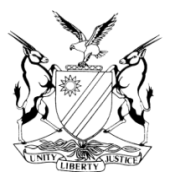REPUBLIC OF NAMIBIA

IN THE HIGH COURT OF NAMIBIA, NORTHERN LOCAL DIVISION, OSHAKATI
REVIEW JUDGMENT
“ANNEXURE 11”
Case Title: The State v Lydia David | CR No.: 39/2020 Case No.: EENHANA 34/2020 | |
Division of Court: Northern Local Division | ||
Heard before: Honourable Mr. Justice January J et Honourable Ms. Justice Diergaardt AJ | Delivered on: 30 June 2020 | |
Neutral citation: S v David (CR 39/2020) [2020] NAHCNLD 80 (30 June 2020) | ||
The order:
| ||
Reasons for the order | ||
Diergaardt AJ (January J concurring): [1] The matter came before me on automatic review in terms of section 304 of Act no 51 of 1977. [2] The accused in this matter was charged with contravention of section 90(a) read with sections 1, 5, 9, 14(1) (a), 36, 59 and 97(1) (b) of the Customs and Excise Act, Act 20 of 1998-Dealing in/possession of illicit goods. He pleaded guilty and the magistrate correctly proceeded to question the accused in terms of section 112(1) (b) of Act 51 of 1977. [3] Despite the fact that the accused continuously disputed the fact that she was found in possession of the goods the Magistrate concluded that the accused admits to all the elements of the offence and proceeded with conviction and sentencing. [4] Section 113 provides for that when an accused’s answers during questioning in terms of section 112 (1) (b) are capable of reasonable interpretation consistent with innocence, a plea of not guilty must be entered (S v W en andere 1999(2) SACR 640 C Joubert 9 ed, Criminal procedure Handbook 7 ed (2005) 213 observes that ‘doubt’ and not probability is sufficient to compel the court to record a plea of not guilty’. [5] I am of the view that on review a convicted accused is a “fortiori” entitled to the benefit of doubt where reasonable grounds exist for a belief that a recorded admission, necessary for a conviction, was not made at all. [6] In instances where an accused does not freely admit to all the elements of the offence the onus rest on the state to prove the accused guilt beyond reasonable doubt. [7] In casu it is clear from the questioning that the accused did not intend to plead guilty and a plea of not guilty should have been entered by the magistrate other than inferring. [8] It has been emphasised on numerous occasions that offences under The Customs and Excise Act are not trivial offences and specifically classifies a contravention of section 90(a) as a serious offence. Therefore it provides as follows: 90 Serious offences and penalties in respect thereof Any person who- (a) has upon his or her premises or in his or her custody or under his or her control, or purchases or otherwise obtains, or sells or otherwise disposes of, any illicit goods, knowing such goods to be illicit goods; or (b) to (o)……….. shall be guilty of an offence and on conviction be liable to a fine not exceeding N$20 000 or to an amount equal to three times the value of the goods in respect of which such offence was committed, whichever is the greater, or to imprisonment for a period not exceeding five years or to both such fine and such imprisonment. (my emphasis) [9] As a result of the strict penalty clause it is of utmost importance for the court to be satisfied that the accused indeed intended to plead guilty. The conviction and sentences in relation to the charge can therefore not be allowed to stand. | ||
Judge(s) signature | Comments: | |
Diergaardt AJ: | ||
January J: | ||